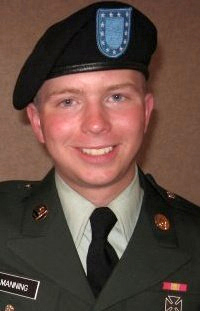FORT MEADE, Md. – Army investigators found nearly half a million field reports from Iraq and Afghanistan on a computer memory card among the belongings of Pfc. Bradley Manning, with a note suggesting that an unidentified recipient “sit on this information” while deciding how best to distribute it, according to testimony Monday.
The note called the reports “possibly one of the more significant documents of our time” and said they would remove “the fog of war” and reveal “the true nature of 21st century asymmetric warfare,” Army special agent David Shaver told the officer leading the preliminary hearing at Fort Meade.
Manning, 24, is accused of giving hundreds of thousands of classified documents to WikiLeaks while serving as an intelligence analyst in Iraq. He is charged with aiding the enemy and violating the Espionage Act.
On the fourth day of the hearing, members of the Army Computer Crimes investigative Unit described how they examined military and personal computers used by Manning, and what they found.
Military computers showed evidence of downloads from servers at the State and Defense departments, they said. Investigators found four detainee assessments from Guantanamo Bay under Manning’s user profile.
A personal computer contained logs from chats about releasing government information, IP addresses associated with WikiLeaks and what appears to be contact information for WikiLeaks founder Julian Assange, they said.
After two days of arguing that Manning was a troubled soldier who should not have been given access to classified materials, his defense team appeared to shift course Monday, suggesting there was no proof that Manning was behind the downloads or the chats.
Shaver acknowledged that the military computers were secure workstations from which analysts were authorized to view material from the State Department and the Defense Department and that more than one analyst was assigned to the computers.
He said that more than 100,000 diplomatic cables couldn’t be connected to Manning, and that 10,000 that were found on his computer didn’t match the cables published by WikiLeaks.
Investigator Mark Johnson, who examined Manning’s personal MacBook Pro, said it was set to boot up without a password — meaning, he acknowledged, that he can’t say for certain that Manning was responsible for the chats, the IP addresses or Assange’s details found on his computer.
“I cannot put somebody at the keyboard, no,” Johnson said.
The Army convened the Article 32 hearing to determine whether the case against Manning should proceed to a court-martial.
Lt. Col. Paul Almanza, the investigating officer presiding over the hearing, will weigh testimony and arguments before making a recommendation to Maj. Gen. Michael Linnington, the commander of the Military District of Washington.
Aiding the enemy is a capital offense, but Army prosecutors say they won’t seek the death penalty. If convicted, Manning could be sentenced to life in prison.
Twice Monday, Almanza cleared the courtroom to hear testimony from Shaver on classified information.
Among those excluded were an attorney for the New York-based Center for Constitutional Rights, which is representing WikiLeaks and Assange.
Baher Azmy, legal director for the nonprofit, said the hearing has been “more restrictive than those at Guantanamo.”
Manning supporters say footage of an Apache helicopter attack that he is alleged to have released appears to show evidence of a war crime.
The 2007 attack in Baghdad left 12 dead, including a Reuters journalist and his driver. In the video, released by WikiLeaks as “Collateral Murder,” the American helicopter crew can be heard laughing and referring to Iraqis as “dead bastards.”
Manning supporters say whoever released the footage is a hero who should be protected as a whistle-blower.
Earlier Monday, Manning’s roommate in Iraq testified that Manning “probably planned on getting out of the military.”
Spc. Eric S. Baker said Manning had told him the Army “wasn’t for him.” He also said Manning used a computer “quite often.”
On cross-examination, Baker acknowledged to Manning’s attorney that the two weren’t friends. Baker affirmed that Manning had made statements that led him to believe he was gay, and Baker responded that it would be best if they didn’t talk.
Copy the Story LinkSend questions/comments to the editors.



Success. Please wait for the page to reload. If the page does not reload within 5 seconds, please refresh the page.
Enter your email and password to access comments.
Hi, to comment on stories you must . This profile is in addition to your subscription and website login.
Already have a commenting profile? .
Invalid username/password.
Please check your email to confirm and complete your registration.
Only subscribers are eligible to post comments. Please subscribe or login first for digital access. Here’s why.
Use the form below to reset your password. When you've submitted your account email, we will send an email with a reset code.